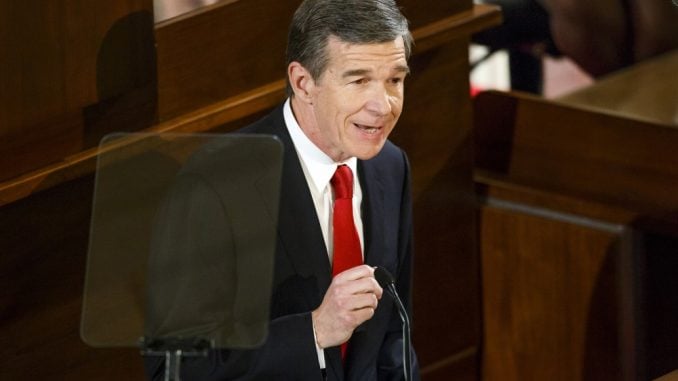
RALEIGH With the launch of the ‘Break the Majority’ fundraising and election drive North Carolina Democrats, led by Gov. Roy Cooper, have officially kicked off a their campaign strategy for 2018 elections and beyond. Republicans, on the other hand, have been busy calling attention to reduced tax rolls and economic success as they look to hold on to super-majorities.The coordinated push by Democrats is leveraging the left’s enmity to Republican policies ranging from taxes to education to “gerrymandered” districts. Even the unpopular, and since repealed, House Bill 2 is still in play as Cooper and other Democrats caution voters against Republican social policies.”We need to restore common sense and balance in our General Assembly and elect lawmakers who will fight for the working and middle class, for public education, and for a forward-looking and inclusive state,” said Cooper in a press release last week announcing the Break the Majority push.The fundraising and recruiting effort has already raised millions in campaign funds for Democrats promising to combat Republican policies that they say took the state backwards.For the Republicans in the N.C. General Assembly the road to 2018 and maintaining their veto-proof majorities has commenced as an information campaign focused on touting the reduced tax and regulatory burdens as well as the Old North State’s lauded economic performance that the majority party attributes to their leadership and reform-minded governance over the last several years in power.”Helping hundreds of thousands of low-income North Carolinians no longer owe any income tax is an outstanding achievement that proves Republican tax reforms are providing relief to citizens who need it most,” said House Speaker Tim Moore (R-Cleveland), in a release highlighting the effects of recent Republican tax reforms of lowered personal and corporate rates as well as increasing standard deductions.A July 17, 2017 memo from the General Assembly’s Fiscal Research Division’s head economist notes “of the nearly 4 million tax returns anticipated for tax year 2019, we estimate the number of returns will decrease an estimated 230,000 when compared with the expected number if the 2012 tax laws were still in effect. The increase in these no-tax-liability returns will be due primarily to the increase in the standard deduction.”To be sure, breaking the Republican majority outright, even by 2020, will be a tough task for Democrats. The Republicans hold super-majorities in both legislative chambers, so the Democrats first step according to Cooper is to cut into that lead in order for them to sustain the governor’s vetoes.Democrats need to gain 3 seats in the House, or six seats in the Senate, to first break the Republican super-majority.



